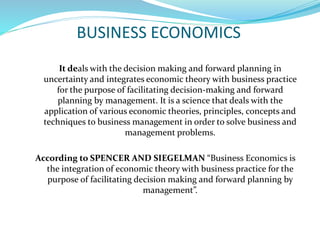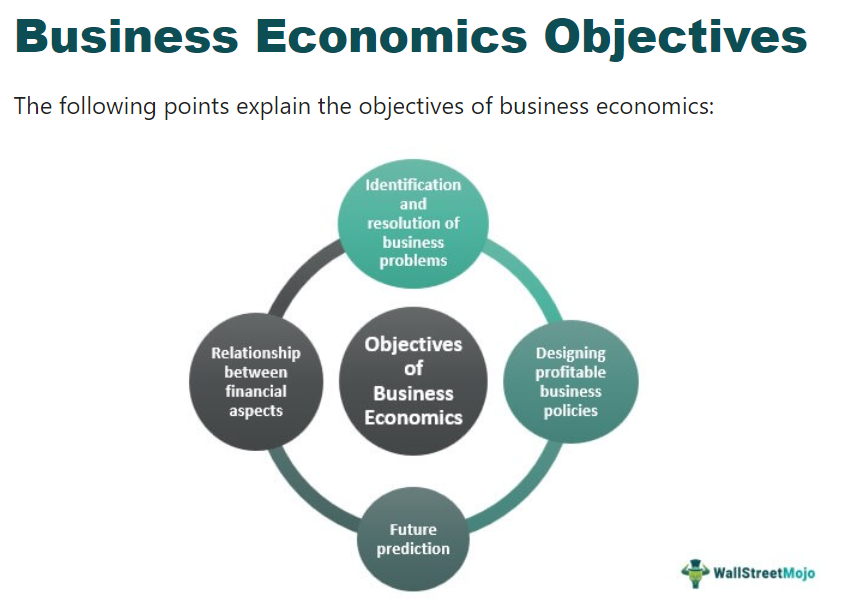Analyzing the Relationship Between Business and Economics in the Age of Technology
Analyzing the Relationship Between Business and Economics in the Age of Technology
Blog Article
Comprehending Economic Concepts for Better Company Decision-Making
In the complex landscape of modern company, a complete understanding of economic concepts can significantly enhance decision-making procedures. The application of these financial concepts usually exposes unforeseen difficulties and opportunities that can redefine calculated techniques.
The Basics of Economic Theory
Economic theory acts as the structure for recognizing just how people and companies choose in the presence of scarcity. At its core, financial theory examines the allotment of limited resources to satisfy endless desires. This fundamental concept of shortage demands compromises, compelling decision-makers to evaluate the benefits and prices associated with various options.
The 2 primary branches of financial theory are macroeconomics and microeconomics. Microeconomics concentrates on specific agents, such as firms and consumers, analyzing their behavior and interactions in specific markets. It stresses ideas like supply and demand, cost flexibility, and market stability, which are important for comprehending just how prices are identified and just how sources are distributed.
On the other hand, macroeconomics examines the economic climate overall, attending to broader issues such as inflation, joblessness, and financial growth. It gives insights right into systemic sensations that influence all economic representatives, guiding policymakers in crafting effective economic methods.
Inevitably, a strong grounding in economic concept is vital for reliable business decision-making. By comprehending the concepts of deficiency, compromises, and market characteristics, companies can much better make and browse complex environments educated choices that improve their affordable benefit.
Trick Economic Indicators
Key economic indications serve as crucial devices for assessing the wellness and direction of an economic situation, offering beneficial understandings for service decision-making. These signs are quantitative measures that show the financial performance and can be classified right into leading, lagging, and coincident indications.
Leading indicators, such as consumer confidence indexes and stock exchange trends, predict future financial task, enabling businesses to expect changes in the marketplace. Delaying signs, like unemployment prices and company revenues, provide understandings into the economy's past performance, assisting companies to evaluate long-term fads. Coincident indicators, such as GDP development and retail sales, change at the same time with the economy, supplying a real-time snapshot of economic problems.
Recognizing these signs allows businesses to make informed choices regarding financial investments, resource allocation, and calculated planning. By very closely keeping track of these key economic indications, businesses can browse uncertainties and position themselves effectively in the ever-changing financial landscape, eventually improving their decision-making procedures and long-lasting success.

Market Structures and Characteristics
Understanding market structures and dynamics is important for organizations aiming to grow in affordable settings. Market frameworks, broadly classified into excellent competition, monopolistic competitors, oligopoly, and monopoly, dramatically affect prices techniques, item differentiation, and affordable actions. Each framework provides unique difficulties and opportunities that can determine a firm's calculated direction.
Oligopolies, his response defined by a few dominant gamers, lead to synergistic decision-making; firms must carefully consider rivals' feedbacks to their activities. Monopolies exist when a solitary company manages the market, resulting in maximum rates power however typically attracting regulative examination.
Understanding these characteristics allows companies to anticipate market fads, adapt strategies, and maximize resource allocation. Furthermore, recognizing how outside elements like modern technology and guideline impact these frameworks can enhance critical planning. By mastering market frameworks and dynamics, companies can make informed choices, eventually boosting their affordable position and driving lasting growth.
Consumer Habits Insights
Customer actions plays an essential duty in forming business methods and outcomes. Comprehending how customers make acquiring decisions, their choices, and the factors influencing their actions can considerably boost a company's capability to fulfill market needs. Secret understandings into consumer habits can be acquired from evaluating demographics, psychographics, and behavior patterns.
Group elements such as age, revenue, education, and gender degree provide a foundational understanding of target markets. Psychographics dig much deeper, discovering consumers' way of lives, values, and mindsets, which can influence brand loyalty and product understanding. Behavioral insights, such as buying frequency and reaction to promotions, are vital for customizing advertising and marketing initiatives.
In addition, exterior variables like financial problems, social patterns, and technological developments likewise impact consumer selections. During financial slumps, consumers might focus on necessary products over luxury things, modifying demand patterns.
Applying Business Economics to Method
Insights acquired from customer actions contribute in formulating effective organization methods. By leveraging economic concepts, services can better recognize market characteristics, optimize source allowance, and improve affordable positioning. Analyzing need elasticity, for example, description allows firms to change pricing approaches to make best use of profits while remaining eye-catching to consumers.
In addition, comprehending market division enables businesses to customize their offerings, guaranteeing they satisfy the details needs and choices of diverse customer groups. Business and Economics. This targeted strategy enhances consumer complete satisfaction and cultivates brand commitment

Incorporating video game concept right into calculated planning also provides understandings right into affordable habits, allowing firms to prepare for competing actions and devise counter-strategies properly.

Conclusion
In final thought, a detailed understanding of financial concepts substantially improves service decision-making. By taking a look at market frameworks, examining customer habits, and analyzing key economic indications, companies can create efficient techniques that line up with market demands.
In the complex landscape of modern-day organization, a thorough understanding of financial concepts can considerably enhance decision-making processes.Leading indicators, such as consumer self-confidence indexes and stock market trends, forecast future financial activity, allowing organizations to expect modifications in the market. By closely monitoring these vital economic indicators, services can browse uncertainties and place themselves successfully in the ever-changing economic landscape, inevitably improving their decision-making processes and lasting success.
By leveraging economic concepts, services can better comprehend market dynamics, maximize resource appropriation, and boost competitive placing.In conclusion, a thorough understanding of economic concepts considerably boosts service decision-making.
Report this page